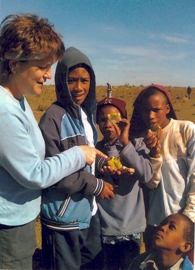
The ELRC collaborates with many projects and partners to encourage environmental education -- from a local to a global scale -- suggesting its utter commitment to the mantra of environmental sustainability: ‘Think globally, act locally.’ The centre is not afraid to get its hands dirty while thinking about the bigger picture. Its role as a Regional Centre of Expertise (RCE) perhaps best demonstrates this approach: in response to UNESCO’s goals for the United Nations Decade of Education for Sustainable Development, the ELRC has actively supported local grassroots projects that are taking small steps toward a more sustainable world.
Recently, the ELRC, known as the Makana and Rural Eastern Cape RCE, attended a conference with representative from 10 southern African RCEs to discuss what was working, what their challenges were and how to function more sustainably. The Swaziland RCE hosted the delegates from seven countries for the two-day meeting. The delegates represented both existing and up-and-coming RCEs.
The conference served, primarily, as a platform to share stories and brainstorm ways of doing things better. Many voiced concerns related to financing and the administration of projects, and the challenge of getting each RCE stakeholder to understand the purpose of an RCE: to provide information and expertise – not simply to fund projects. RCE Namibia shared an encouraging story about how it was able to overcome the difficulty of communicating with disparate stakeholders by creating a Google group. RCE Makana and Rural Eastern Cape conducted a workshop on Media and Communications to accentuate the importance of good communications as a primary function of an RCE. The presentation offered helpful tools for communication including a lesson on writing a news article.
Because there is no single model for an RCE and it is merely a network for existing formal and non-formal organisations that support education for sustainable development (ESD), each RCE looks different from one another. RCEs can run thorough various institutional frameworks including, local government, environmental NGOs and universities. There are 85 existing RCEs in the world, with six accredited RCEs in southern Africa.
The conference re-emphasized the primary role of the RCE: to collate information and act as a hub for existing environmental projects in a region. It stressed that its aim is to support these projects, which can mean anything from providing research and information and practical help, to getting projects with similar objectives to collaborate. An RCE works with stakeholders across the board: NGOs, community organisations, the private sector, local and regional government, schools and universities and individuals.
As a strategically placed RCE, with access to both developed and rural communities, the ELRC has the important role of aligning relevant stakeholders. At the conference, it identified a few possible points of improvement, namely, working with youth and extending its reach beyond the local community.
